Comparative Analysis of Business Ethics and Social Responsibility
VerifiedAdded on 2023/06/11
|8
|1830
|108
Essay
AI Summary
This essay provides a comparative analysis of business ethics and corporate social responsibility (CSR), drawing insights from an article on integrating CSR into business administration education. It highlights the importance of ethics and CSR for business success, sustainability, and reliability. The essay discusses key ethical issues such as corporate social responsibility, sustainability, and the role of education in fostering ethical business practices. It argues that businesses should prioritize ethical conduct and social responsibility, even if it entails incurring costs or forfeiting profits, aligning with the utilitarianism moral theory. Furthermore, the essay suggests that legal actions should be considered for businesses that violate ethical standards. The conclusion emphasizes the mutual benefits of ethical and socially responsible behavior for both businesses and society, advocating for the integration of these principles into all business operations. Desklib provides access to similar essays and study resources for students.
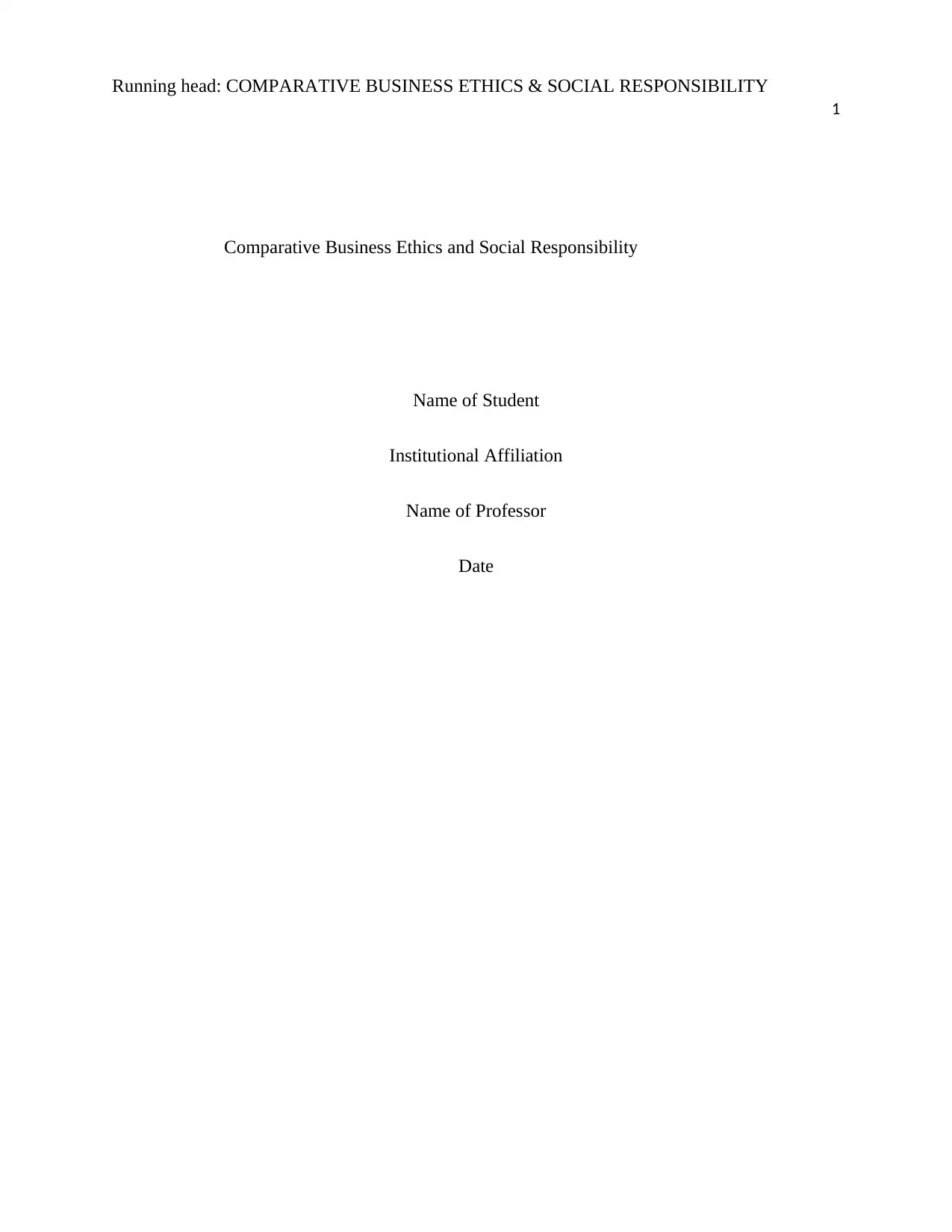
Running head: COMPARATIVE BUSINESS ETHICS & SOCIAL RESPONSIBILITY
1
Comparative Business Ethics and Social Responsibility
Name of Student
Institutional Affiliation
Name of Professor
Date
1
Comparative Business Ethics and Social Responsibility
Name of Student
Institutional Affiliation
Name of Professor
Date
Paraphrase This Document
Need a fresh take? Get an instant paraphrase of this document with our AI Paraphraser
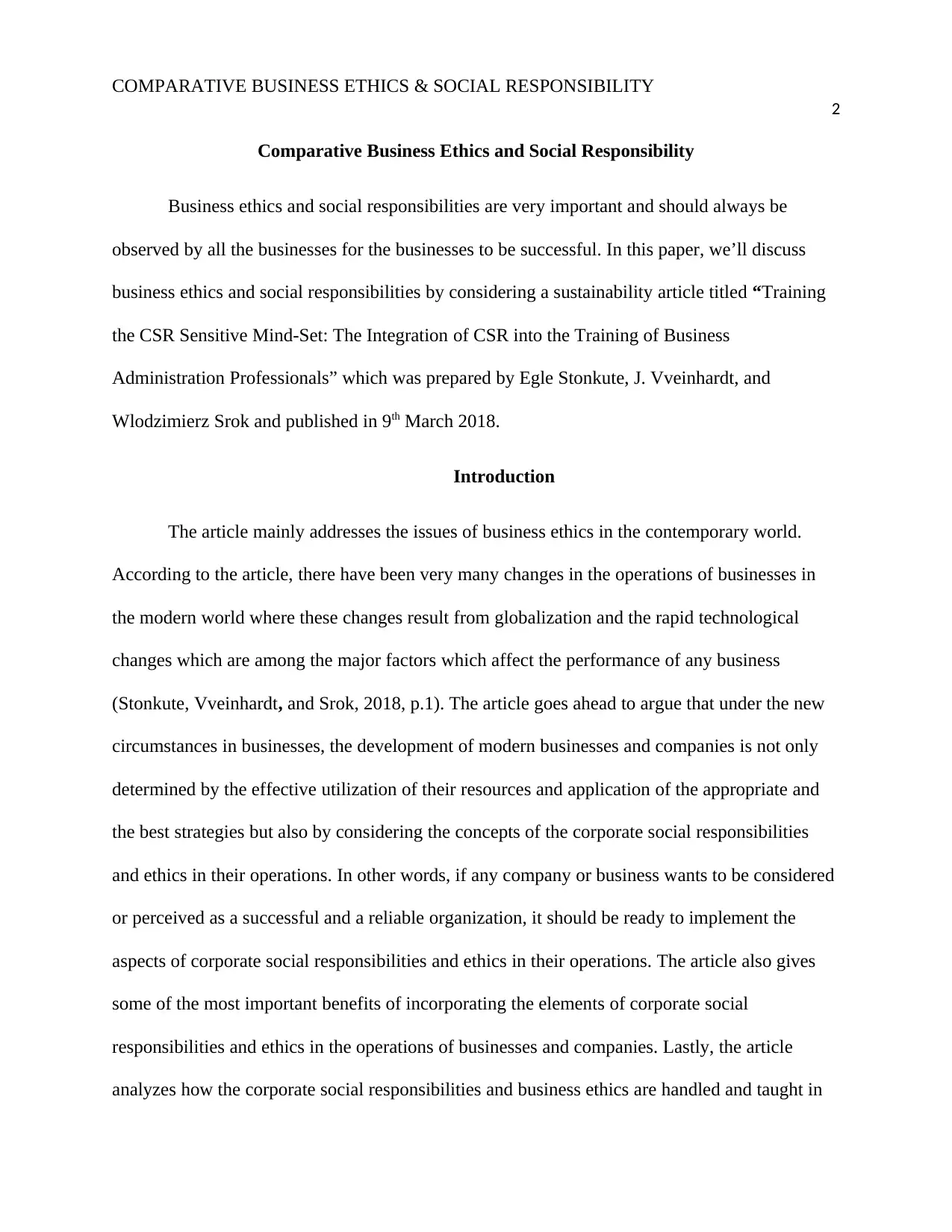
COMPARATIVE BUSINESS ETHICS & SOCIAL RESPONSIBILITY
2
Comparative Business Ethics and Social Responsibility
Business ethics and social responsibilities are very important and should always be
observed by all the businesses for the businesses to be successful. In this paper, we’ll discuss
business ethics and social responsibilities by considering a sustainability article titled “Training
the CSR Sensitive Mind-Set: The Integration of CSR into the Training of Business
Administration Professionals” which was prepared by Egle Stonkute, J. Vveinhardt, and
Wlodzimierz Srok and published in 9th March 2018.
Introduction
The article mainly addresses the issues of business ethics in the contemporary world.
According to the article, there have been very many changes in the operations of businesses in
the modern world where these changes result from globalization and the rapid technological
changes which are among the major factors which affect the performance of any business
(Stonkute, Vveinhardt, and Srok, 2018, p.1). The article goes ahead to argue that under the new
circumstances in businesses, the development of modern businesses and companies is not only
determined by the effective utilization of their resources and application of the appropriate and
the best strategies but also by considering the concepts of the corporate social responsibilities
and ethics in their operations. In other words, if any company or business wants to be considered
or perceived as a successful and a reliable organization, it should be ready to implement the
aspects of corporate social responsibilities and ethics in their operations. The article also gives
some of the most important benefits of incorporating the elements of corporate social
responsibilities and ethics in the operations of businesses and companies. Lastly, the article
analyzes how the corporate social responsibilities and business ethics are handled and taught in
2
Comparative Business Ethics and Social Responsibility
Business ethics and social responsibilities are very important and should always be
observed by all the businesses for the businesses to be successful. In this paper, we’ll discuss
business ethics and social responsibilities by considering a sustainability article titled “Training
the CSR Sensitive Mind-Set: The Integration of CSR into the Training of Business
Administration Professionals” which was prepared by Egle Stonkute, J. Vveinhardt, and
Wlodzimierz Srok and published in 9th March 2018.
Introduction
The article mainly addresses the issues of business ethics in the contemporary world.
According to the article, there have been very many changes in the operations of businesses in
the modern world where these changes result from globalization and the rapid technological
changes which are among the major factors which affect the performance of any business
(Stonkute, Vveinhardt, and Srok, 2018, p.1). The article goes ahead to argue that under the new
circumstances in businesses, the development of modern businesses and companies is not only
determined by the effective utilization of their resources and application of the appropriate and
the best strategies but also by considering the concepts of the corporate social responsibilities
and ethics in their operations. In other words, if any company or business wants to be considered
or perceived as a successful and a reliable organization, it should be ready to implement the
aspects of corporate social responsibilities and ethics in their operations. The article also gives
some of the most important benefits of incorporating the elements of corporate social
responsibilities and ethics in the operations of businesses and companies. Lastly, the article
analyzes how the corporate social responsibilities and business ethics are handled and taught in
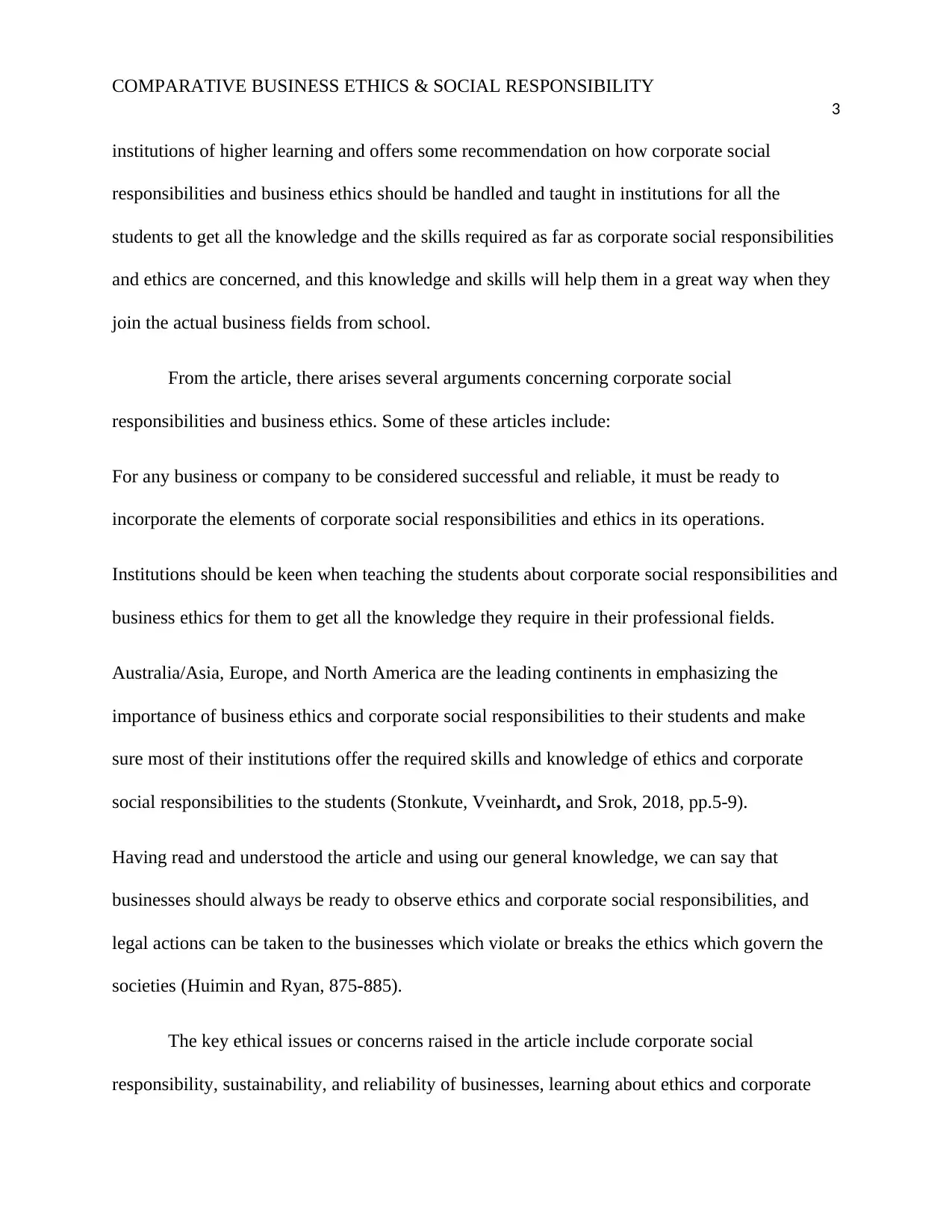
COMPARATIVE BUSINESS ETHICS & SOCIAL RESPONSIBILITY
3
institutions of higher learning and offers some recommendation on how corporate social
responsibilities and business ethics should be handled and taught in institutions for all the
students to get all the knowledge and the skills required as far as corporate social responsibilities
and ethics are concerned, and this knowledge and skills will help them in a great way when they
join the actual business fields from school.
From the article, there arises several arguments concerning corporate social
responsibilities and business ethics. Some of these articles include:
For any business or company to be considered successful and reliable, it must be ready to
incorporate the elements of corporate social responsibilities and ethics in its operations.
Institutions should be keen when teaching the students about corporate social responsibilities and
business ethics for them to get all the knowledge they require in their professional fields.
Australia/Asia, Europe, and North America are the leading continents in emphasizing the
importance of business ethics and corporate social responsibilities to their students and make
sure most of their institutions offer the required skills and knowledge of ethics and corporate
social responsibilities to the students (Stonkute, Vveinhardt, and Srok, 2018, pp.5-9).
Having read and understood the article and using our general knowledge, we can say that
businesses should always be ready to observe ethics and corporate social responsibilities, and
legal actions can be taken to the businesses which violate or breaks the ethics which govern the
societies (Huimin and Ryan, 875-885).
The key ethical issues or concerns raised in the article include corporate social
responsibility, sustainability, and reliability of businesses, learning about ethics and corporate
3
institutions of higher learning and offers some recommendation on how corporate social
responsibilities and business ethics should be handled and taught in institutions for all the
students to get all the knowledge and the skills required as far as corporate social responsibilities
and ethics are concerned, and this knowledge and skills will help them in a great way when they
join the actual business fields from school.
From the article, there arises several arguments concerning corporate social
responsibilities and business ethics. Some of these articles include:
For any business or company to be considered successful and reliable, it must be ready to
incorporate the elements of corporate social responsibilities and ethics in its operations.
Institutions should be keen when teaching the students about corporate social responsibilities and
business ethics for them to get all the knowledge they require in their professional fields.
Australia/Asia, Europe, and North America are the leading continents in emphasizing the
importance of business ethics and corporate social responsibilities to their students and make
sure most of their institutions offer the required skills and knowledge of ethics and corporate
social responsibilities to the students (Stonkute, Vveinhardt, and Srok, 2018, pp.5-9).
Having read and understood the article and using our general knowledge, we can say that
businesses should always be ready to observe ethics and corporate social responsibilities, and
legal actions can be taken to the businesses which violate or breaks the ethics which govern the
societies (Huimin and Ryan, 875-885).
The key ethical issues or concerns raised in the article include corporate social
responsibility, sustainability, and reliability of businesses, learning about ethics and corporate
⊘ This is a preview!⊘
Do you want full access?
Subscribe today to unlock all pages.

Trusted by 1+ million students worldwide
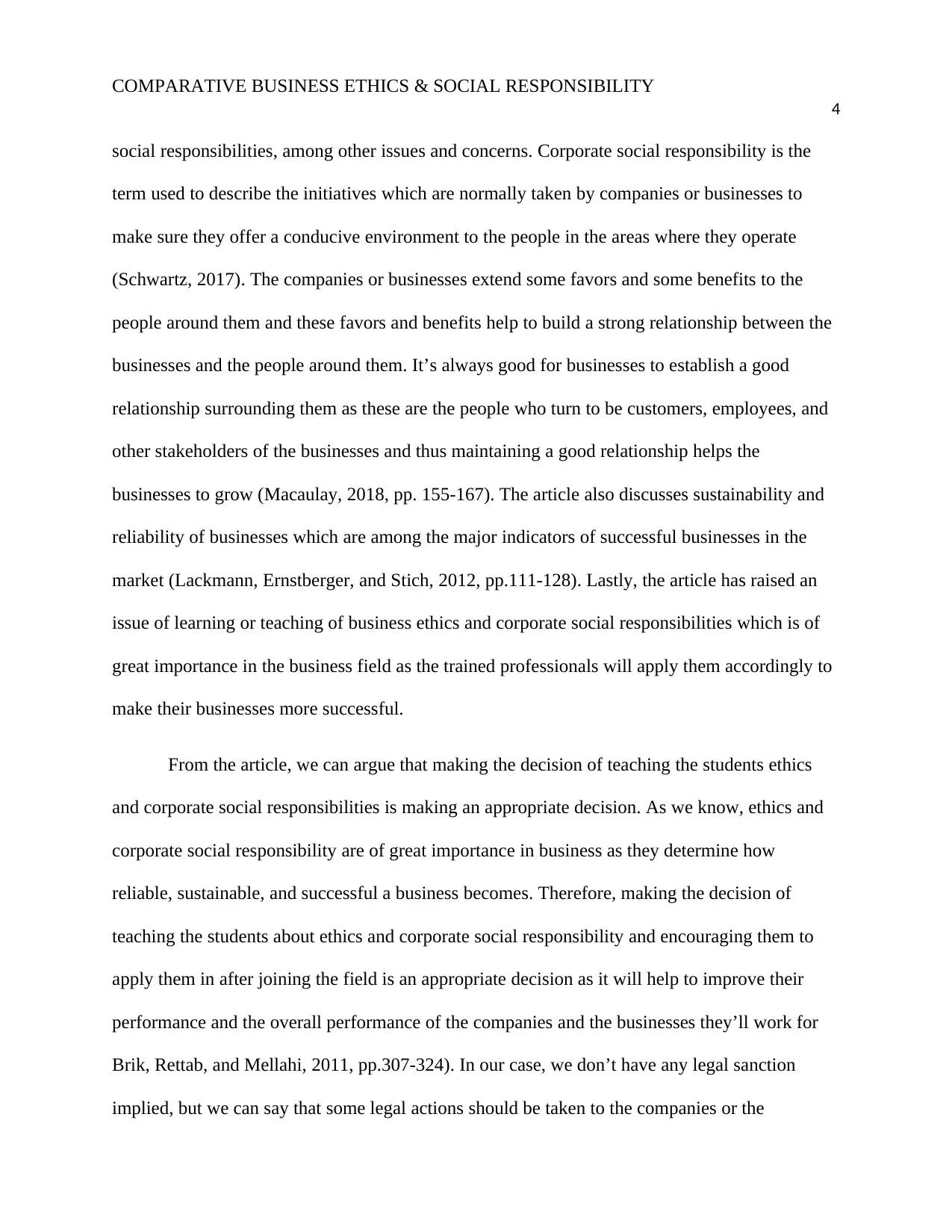
COMPARATIVE BUSINESS ETHICS & SOCIAL RESPONSIBILITY
4
social responsibilities, among other issues and concerns. Corporate social responsibility is the
term used to describe the initiatives which are normally taken by companies or businesses to
make sure they offer a conducive environment to the people in the areas where they operate
(Schwartz, 2017). The companies or businesses extend some favors and some benefits to the
people around them and these favors and benefits help to build a strong relationship between the
businesses and the people around them. It’s always good for businesses to establish a good
relationship surrounding them as these are the people who turn to be customers, employees, and
other stakeholders of the businesses and thus maintaining a good relationship helps the
businesses to grow (Macaulay, 2018, pp. 155-167). The article also discusses sustainability and
reliability of businesses which are among the major indicators of successful businesses in the
market (Lackmann, Ernstberger, and Stich, 2012, pp.111-128). Lastly, the article has raised an
issue of learning or teaching of business ethics and corporate social responsibilities which is of
great importance in the business field as the trained professionals will apply them accordingly to
make their businesses more successful.
From the article, we can argue that making the decision of teaching the students ethics
and corporate social responsibilities is making an appropriate decision. As we know, ethics and
corporate social responsibility are of great importance in business as they determine how
reliable, sustainable, and successful a business becomes. Therefore, making the decision of
teaching the students about ethics and corporate social responsibility and encouraging them to
apply them in after joining the field is an appropriate decision as it will help to improve their
performance and the overall performance of the companies and the businesses they’ll work for
Brik, Rettab, and Mellahi, 2011, pp.307-324). In our case, we don’t have any legal sanction
implied, but we can say that some legal actions should be taken to the companies or the
4
social responsibilities, among other issues and concerns. Corporate social responsibility is the
term used to describe the initiatives which are normally taken by companies or businesses to
make sure they offer a conducive environment to the people in the areas where they operate
(Schwartz, 2017). The companies or businesses extend some favors and some benefits to the
people around them and these favors and benefits help to build a strong relationship between the
businesses and the people around them. It’s always good for businesses to establish a good
relationship surrounding them as these are the people who turn to be customers, employees, and
other stakeholders of the businesses and thus maintaining a good relationship helps the
businesses to grow (Macaulay, 2018, pp. 155-167). The article also discusses sustainability and
reliability of businesses which are among the major indicators of successful businesses in the
market (Lackmann, Ernstberger, and Stich, 2012, pp.111-128). Lastly, the article has raised an
issue of learning or teaching of business ethics and corporate social responsibilities which is of
great importance in the business field as the trained professionals will apply them accordingly to
make their businesses more successful.
From the article, we can argue that making the decision of teaching the students ethics
and corporate social responsibilities is making an appropriate decision. As we know, ethics and
corporate social responsibility are of great importance in business as they determine how
reliable, sustainable, and successful a business becomes. Therefore, making the decision of
teaching the students about ethics and corporate social responsibility and encouraging them to
apply them in after joining the field is an appropriate decision as it will help to improve their
performance and the overall performance of the companies and the businesses they’ll work for
Brik, Rettab, and Mellahi, 2011, pp.307-324). In our case, we don’t have any legal sanction
implied, but we can say that some legal actions should be taken to the companies or the
Paraphrase This Document
Need a fresh take? Get an instant paraphrase of this document with our AI Paraphraser
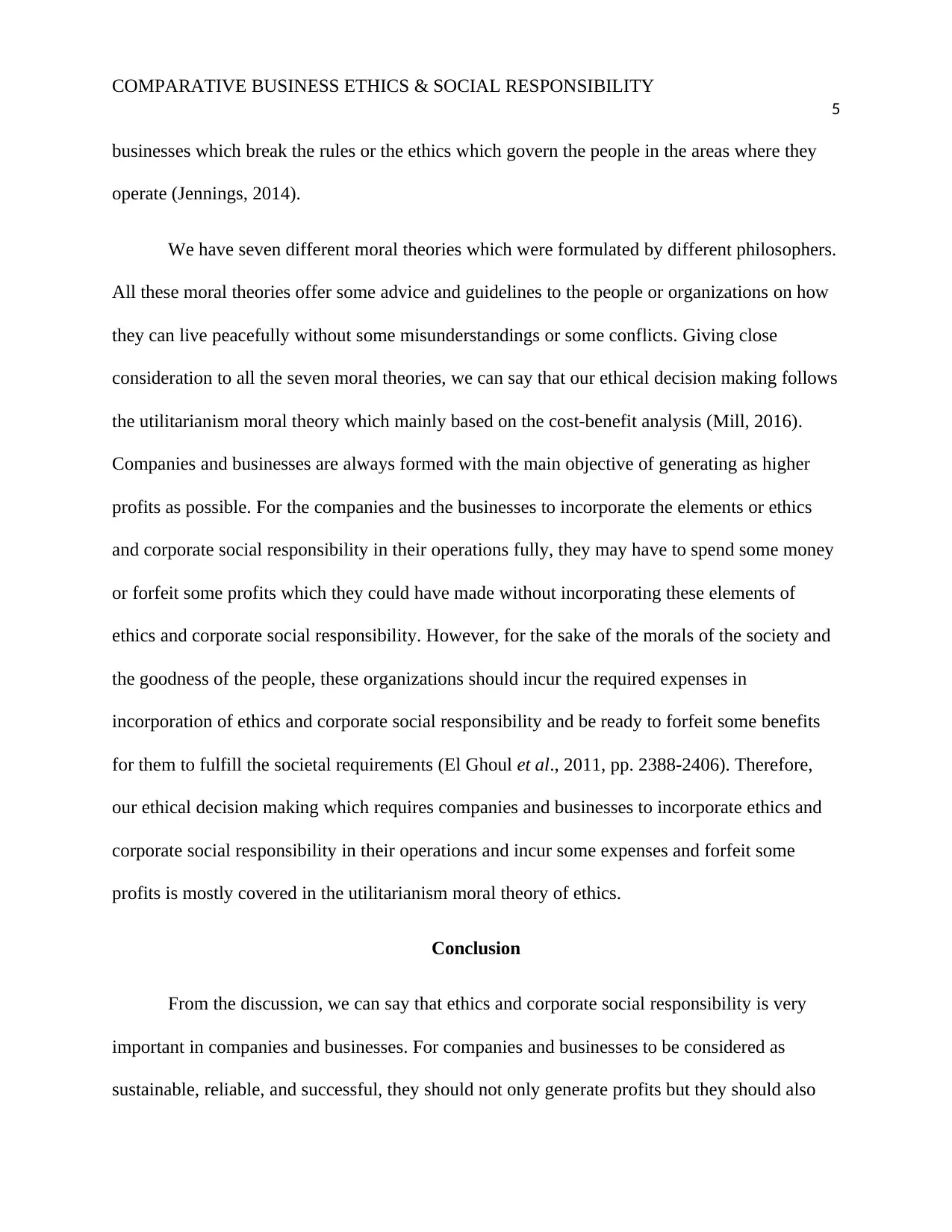
COMPARATIVE BUSINESS ETHICS & SOCIAL RESPONSIBILITY
5
businesses which break the rules or the ethics which govern the people in the areas where they
operate (Jennings, 2014).
We have seven different moral theories which were formulated by different philosophers.
All these moral theories offer some advice and guidelines to the people or organizations on how
they can live peacefully without some misunderstandings or some conflicts. Giving close
consideration to all the seven moral theories, we can say that our ethical decision making follows
the utilitarianism moral theory which mainly based on the cost-benefit analysis (Mill, 2016).
Companies and businesses are always formed with the main objective of generating as higher
profits as possible. For the companies and the businesses to incorporate the elements or ethics
and corporate social responsibility in their operations fully, they may have to spend some money
or forfeit some profits which they could have made without incorporating these elements of
ethics and corporate social responsibility. However, for the sake of the morals of the society and
the goodness of the people, these organizations should incur the required expenses in
incorporation of ethics and corporate social responsibility and be ready to forfeit some benefits
for them to fulfill the societal requirements (El Ghoul et al., 2011, pp. 2388-2406). Therefore,
our ethical decision making which requires companies and businesses to incorporate ethics and
corporate social responsibility in their operations and incur some expenses and forfeit some
profits is mostly covered in the utilitarianism moral theory of ethics.
Conclusion
From the discussion, we can say that ethics and corporate social responsibility is very
important in companies and businesses. For companies and businesses to be considered as
sustainable, reliable, and successful, they should not only generate profits but they should also
5
businesses which break the rules or the ethics which govern the people in the areas where they
operate (Jennings, 2014).
We have seven different moral theories which were formulated by different philosophers.
All these moral theories offer some advice and guidelines to the people or organizations on how
they can live peacefully without some misunderstandings or some conflicts. Giving close
consideration to all the seven moral theories, we can say that our ethical decision making follows
the utilitarianism moral theory which mainly based on the cost-benefit analysis (Mill, 2016).
Companies and businesses are always formed with the main objective of generating as higher
profits as possible. For the companies and the businesses to incorporate the elements or ethics
and corporate social responsibility in their operations fully, they may have to spend some money
or forfeit some profits which they could have made without incorporating these elements of
ethics and corporate social responsibility. However, for the sake of the morals of the society and
the goodness of the people, these organizations should incur the required expenses in
incorporation of ethics and corporate social responsibility and be ready to forfeit some benefits
for them to fulfill the societal requirements (El Ghoul et al., 2011, pp. 2388-2406). Therefore,
our ethical decision making which requires companies and businesses to incorporate ethics and
corporate social responsibility in their operations and incur some expenses and forfeit some
profits is mostly covered in the utilitarianism moral theory of ethics.
Conclusion
From the discussion, we can say that ethics and corporate social responsibility is very
important in companies and businesses. For companies and businesses to be considered as
sustainable, reliable, and successful, they should not only generate profits but they should also
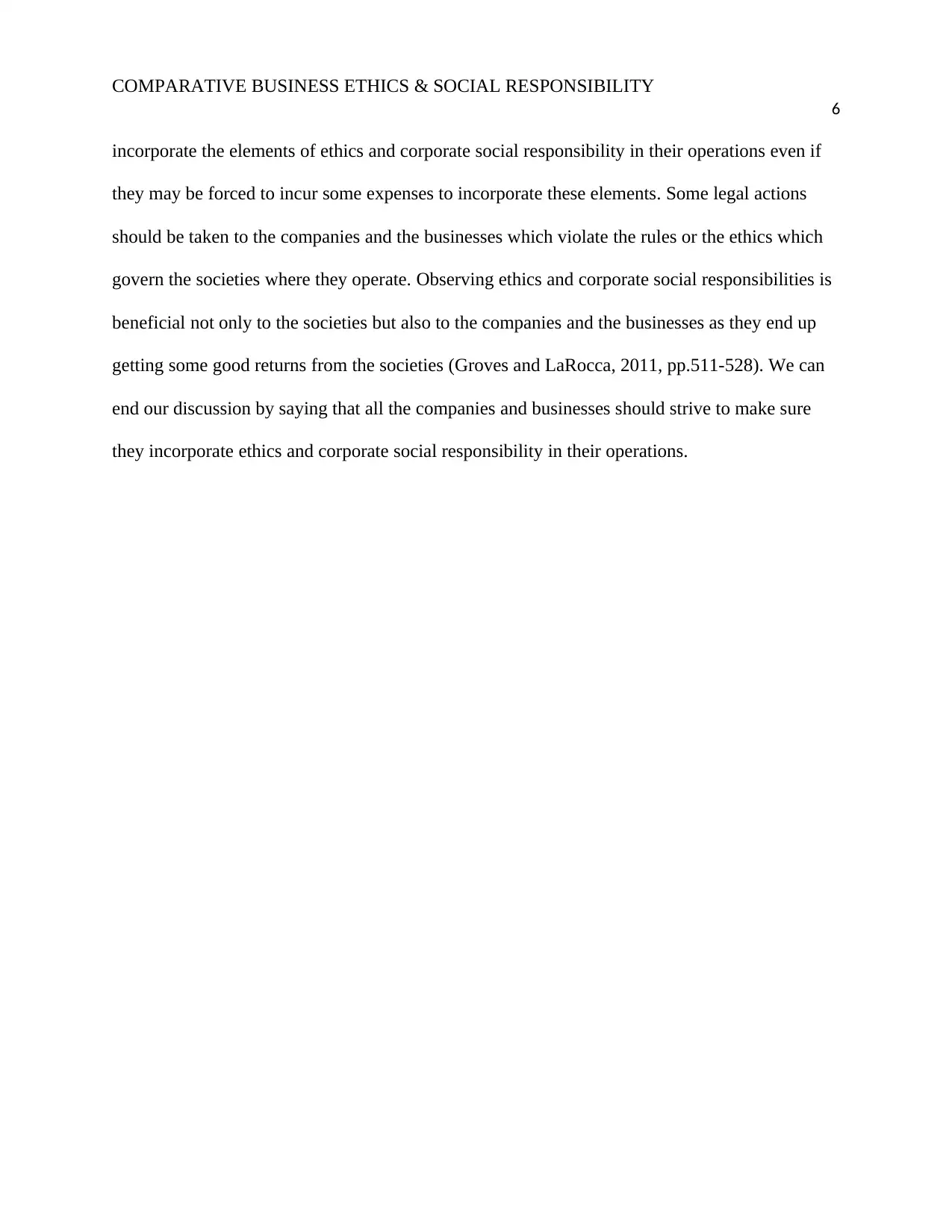
COMPARATIVE BUSINESS ETHICS & SOCIAL RESPONSIBILITY
6
incorporate the elements of ethics and corporate social responsibility in their operations even if
they may be forced to incur some expenses to incorporate these elements. Some legal actions
should be taken to the companies and the businesses which violate the rules or the ethics which
govern the societies where they operate. Observing ethics and corporate social responsibilities is
beneficial not only to the societies but also to the companies and the businesses as they end up
getting some good returns from the societies (Groves and LaRocca, 2011, pp.511-528). We can
end our discussion by saying that all the companies and businesses should strive to make sure
they incorporate ethics and corporate social responsibility in their operations.
6
incorporate the elements of ethics and corporate social responsibility in their operations even if
they may be forced to incur some expenses to incorporate these elements. Some legal actions
should be taken to the companies and the businesses which violate the rules or the ethics which
govern the societies where they operate. Observing ethics and corporate social responsibilities is
beneficial not only to the societies but also to the companies and the businesses as they end up
getting some good returns from the societies (Groves and LaRocca, 2011, pp.511-528). We can
end our discussion by saying that all the companies and businesses should strive to make sure
they incorporate ethics and corporate social responsibility in their operations.
⊘ This is a preview!⊘
Do you want full access?
Subscribe today to unlock all pages.

Trusted by 1+ million students worldwide
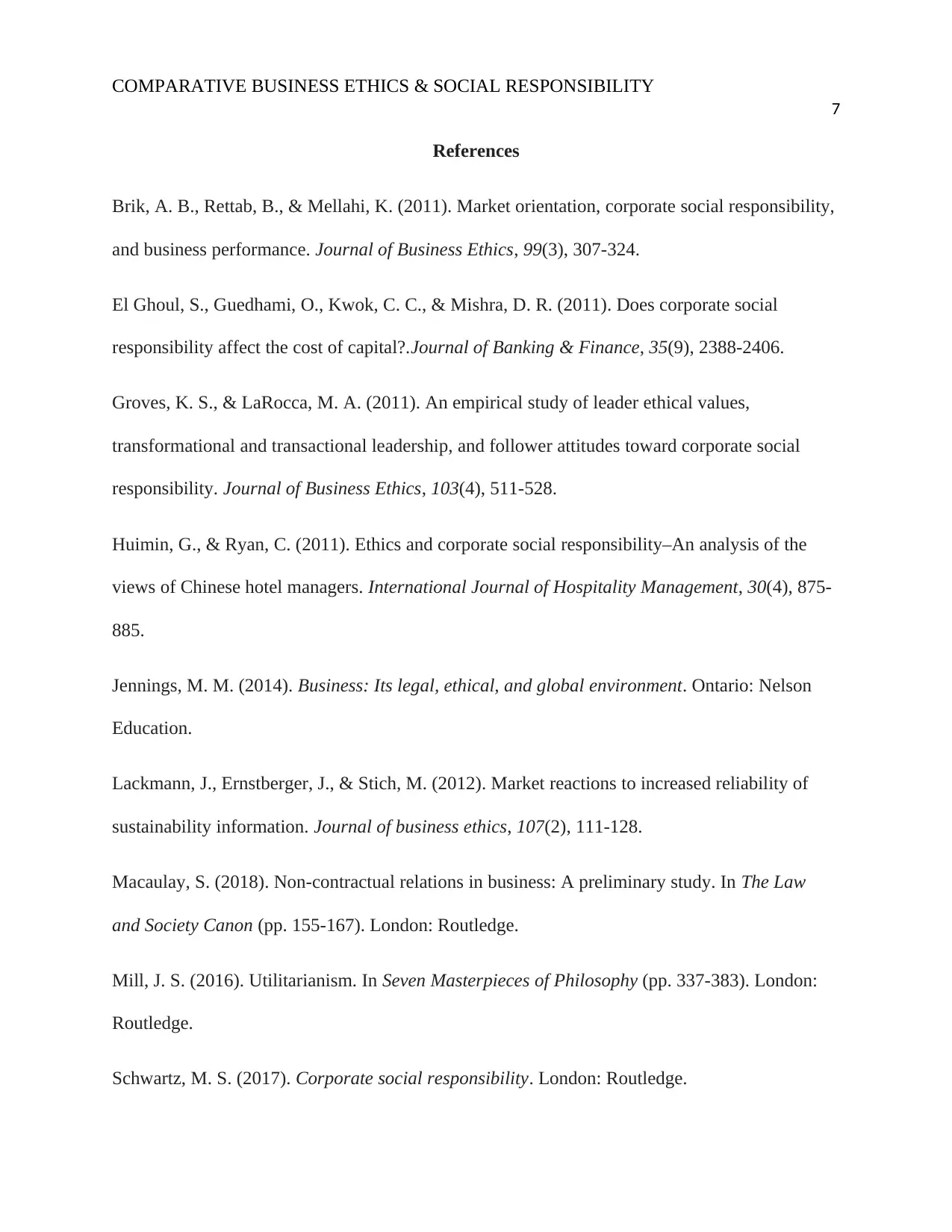
COMPARATIVE BUSINESS ETHICS & SOCIAL RESPONSIBILITY
7
References
Brik, A. B., Rettab, B., & Mellahi, K. (2011). Market orientation, corporate social responsibility,
and business performance. Journal of Business Ethics, 99(3), 307-324.
El Ghoul, S., Guedhami, O., Kwok, C. C., & Mishra, D. R. (2011). Does corporate social
responsibility affect the cost of capital?.Journal of Banking & Finance, 35(9), 2388-2406.
Groves, K. S., & LaRocca, M. A. (2011). An empirical study of leader ethical values,
transformational and transactional leadership, and follower attitudes toward corporate social
responsibility. Journal of Business Ethics, 103(4), 511-528.
Huimin, G., & Ryan, C. (2011). Ethics and corporate social responsibility–An analysis of the
views of Chinese hotel managers. International Journal of Hospitality Management, 30(4), 875-
885.
Jennings, M. M. (2014). Business: Its legal, ethical, and global environment. Ontario: Nelson
Education.
Lackmann, J., Ernstberger, J., & Stich, M. (2012). Market reactions to increased reliability of
sustainability information. Journal of business ethics, 107(2), 111-128.
Macaulay, S. (2018). Non-contractual relations in business: A preliminary study. In The Law
and Society Canon (pp. 155-167). London: Routledge.
Mill, J. S. (2016). Utilitarianism. In Seven Masterpieces of Philosophy (pp. 337-383). London:
Routledge.
Schwartz, M. S. (2017). Corporate social responsibility. London: Routledge.
7
References
Brik, A. B., Rettab, B., & Mellahi, K. (2011). Market orientation, corporate social responsibility,
and business performance. Journal of Business Ethics, 99(3), 307-324.
El Ghoul, S., Guedhami, O., Kwok, C. C., & Mishra, D. R. (2011). Does corporate social
responsibility affect the cost of capital?.Journal of Banking & Finance, 35(9), 2388-2406.
Groves, K. S., & LaRocca, M. A. (2011). An empirical study of leader ethical values,
transformational and transactional leadership, and follower attitudes toward corporate social
responsibility. Journal of Business Ethics, 103(4), 511-528.
Huimin, G., & Ryan, C. (2011). Ethics and corporate social responsibility–An analysis of the
views of Chinese hotel managers. International Journal of Hospitality Management, 30(4), 875-
885.
Jennings, M. M. (2014). Business: Its legal, ethical, and global environment. Ontario: Nelson
Education.
Lackmann, J., Ernstberger, J., & Stich, M. (2012). Market reactions to increased reliability of
sustainability information. Journal of business ethics, 107(2), 111-128.
Macaulay, S. (2018). Non-contractual relations in business: A preliminary study. In The Law
and Society Canon (pp. 155-167). London: Routledge.
Mill, J. S. (2016). Utilitarianism. In Seven Masterpieces of Philosophy (pp. 337-383). London:
Routledge.
Schwartz, M. S. (2017). Corporate social responsibility. London: Routledge.
Paraphrase This Document
Need a fresh take? Get an instant paraphrase of this document with our AI Paraphraser
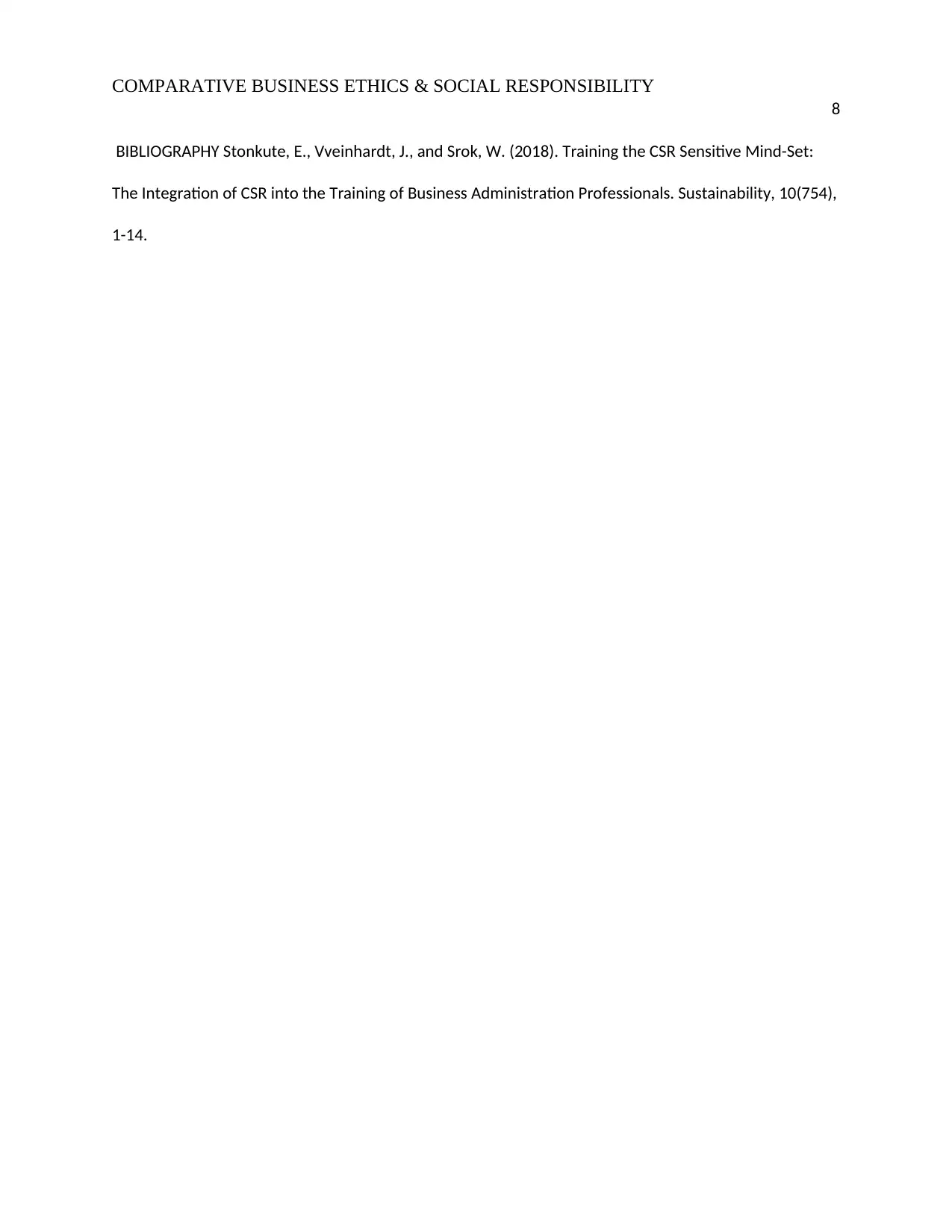
COMPARATIVE BUSINESS ETHICS & SOCIAL RESPONSIBILITY
8
BIBLIOGRAPHY Stonkute, E., Vveinhardt, J., and Srok, W. (2018). Training the CSR Sensitive Mind-Set:
The Integration of CSR into the Training of Business Administration Professionals. Sustainability, 10(754),
1-14.
8
BIBLIOGRAPHY Stonkute, E., Vveinhardt, J., and Srok, W. (2018). Training the CSR Sensitive Mind-Set:
The Integration of CSR into the Training of Business Administration Professionals. Sustainability, 10(754),
1-14.
1 out of 8
Related Documents
Your All-in-One AI-Powered Toolkit for Academic Success.
+13062052269
info@desklib.com
Available 24*7 on WhatsApp / Email
![[object Object]](/_next/static/media/star-bottom.7253800d.svg)
Unlock your academic potential
Copyright © 2020–2026 A2Z Services. All Rights Reserved. Developed and managed by ZUCOL.





